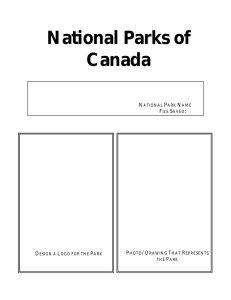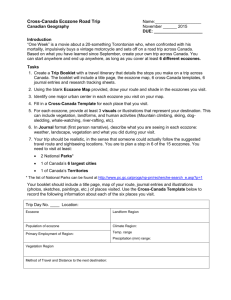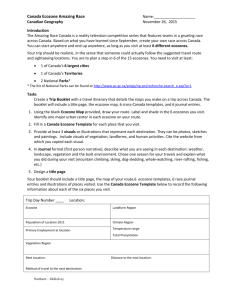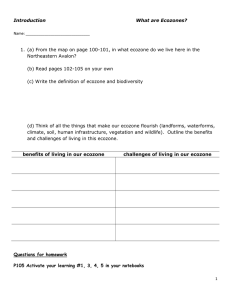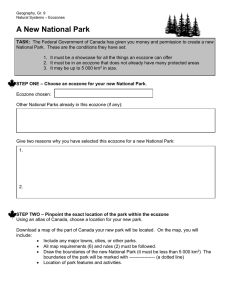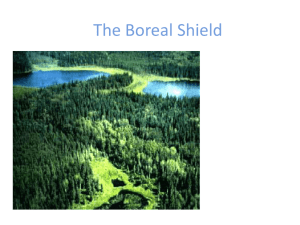AP ENVIRONMENTAL SCIENCE - Ag.& Environmental Sciences
advertisement
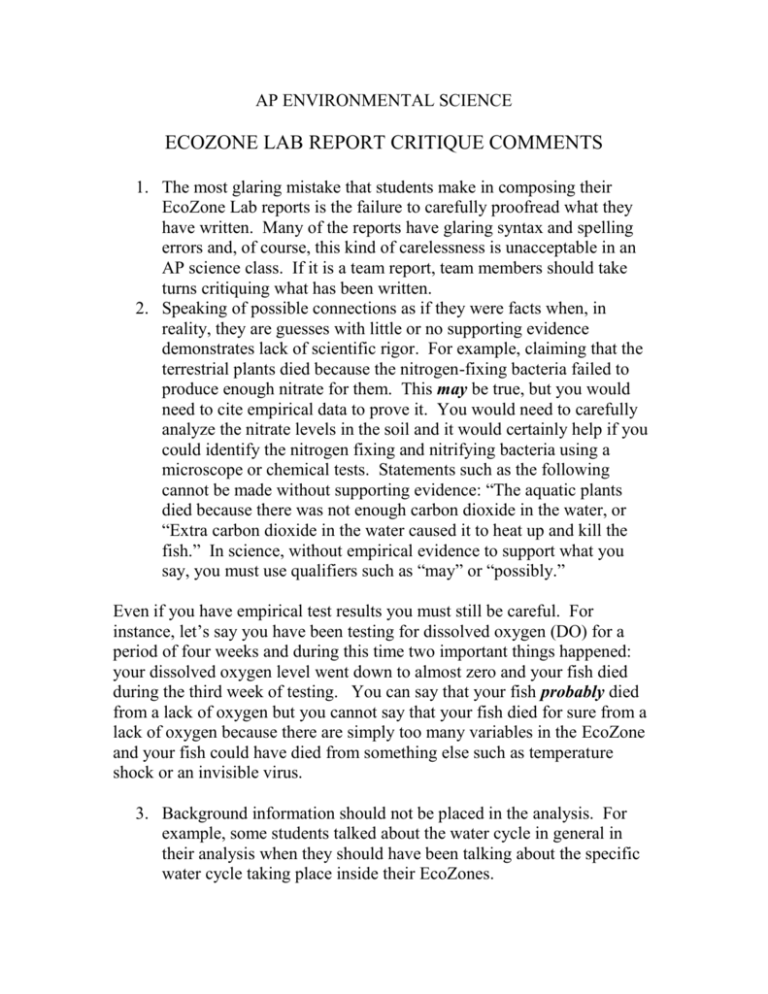
AP ENVIRONMENTAL SCIENCE ECOZONE LAB REPORT CRITIQUE COMMENTS 1. The most glaring mistake that students make in composing their EcoZone Lab reports is the failure to carefully proofread what they have written. Many of the reports have glaring syntax and spelling errors and, of course, this kind of carelessness is unacceptable in an AP science class. If it is a team report, team members should take turns critiquing what has been written. 2. Speaking of possible connections as if they were facts when, in reality, they are guesses with little or no supporting evidence demonstrates lack of scientific rigor. For example, claiming that the terrestrial plants died because the nitrogen-fixing bacteria failed to produce enough nitrate for them. This may be true, but you would need to cite empirical data to prove it. You would need to carefully analyze the nitrate levels in the soil and it would certainly help if you could identify the nitrogen fixing and nitrifying bacteria using a microscope or chemical tests. Statements such as the following cannot be made without supporting evidence: “The aquatic plants died because there was not enough carbon dioxide in the water, or “Extra carbon dioxide in the water caused it to heat up and kill the fish.” In science, without empirical evidence to support what you say, you must use qualifiers such as “may” or “possibly.” Even if you have empirical test results you must still be careful. For instance, let’s say you have been testing for dissolved oxygen (DO) for a period of four weeks and during this time two important things happened: your dissolved oxygen level went down to almost zero and your fish died during the third week of testing. You can say that your fish probably died from a lack of oxygen but you cannot say that your fish died for sure from a lack of oxygen because there are simply too many variables in the EcoZone and your fish could have died from something else such as temperature shock or an invisible virus. 3. Background information should not be placed in the analysis. For example, some students talked about the water cycle in general in their analysis when they should have been talking about the specific water cycle taking place inside their EcoZones. 4. Always make sure to add the proper units to numbers that need them. For instance, students might write that the dissolved oxygen was 7 and the turbidity was 45. Seven what? Forty-five what? Someone who read your report and was not familiar with what you were researching would have no idea what you are talking about. 5. Often students would make a correct assumption but not follow through with a complete explanation. For example, one student wrote, “Watering the decomposition chamber reduced the oxygen in the aquatic chamber.” The student needs to explain why the oxygen level probably went down. 6. Just because your results do not support your hypothesis does not mean that you were “not a success” or that your experiment was a failure. In science, the whole goal is to gain truthful information even though it may not be what you expect. One student said that their EcoZone had “failed” when they should have just said that their EcoZone had changed. 7. You should not use euphemisms; just use simple direct language. One student indicated that his fish had “passed away” when he should have just said that it died. 8. Always use your data to support what you say. So if you write that the water became too hot for the aquatic plants to survive, you should present your quantitative data by giving a specific temperature such as 29 degrees Celsius as you are writing your analysis even thought the data may be presented in a data chart in another part of the lab report. 9. Terms such as “limiting factor”, “competitive exclusion”, and “range of tolerance” were often misunderstood and misused. Make sure you know the exact definition of a term before you try to use it. 10. Make sure to discuss the possible implications of your statements. For instance, one student wrote that there was a drastic reduction in nitrate levels from one week to the next, but failed to discuss what the possible implications might be.
